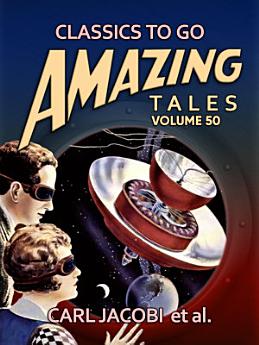Amazing Tales Volume 50
Jan 2025 · CLASSICS TO GO Book 50 · Otbebookpublishing
Ebook
85
Pages
family_home
Eligible
info
reportRatings and reviews aren’t verified Learn More
About this ebook
Journey Beyond the Stars with "Amazing Tales Volume 50". Prepare to be transported to the farthest reaches of the universe with "Amazing Tales Volume 50", an electrifying science fiction anthology offering an unparalleled expedition. This collection is not just a book—it's your ticket to a cosmos teeming with adventure, mystery, and survival. Dive into "Space Bat", where survival becomes an art as Lou Flint faces off against both ferocious alien life forms and human foes on a desolate, uncharted planetoid. It's a relentless battle that will test the limits of bravery and resourcefulness. In "Doctor Universe", join the intrepid Grannie Annie as she navigates a universe riddled with peril and intrigue. This audacious heroine faces a web of galactic chaos, where every twist and turn unveils a new layer of danger and excitement. Unravel the secrets hidden in "Enter the Nebula", where Phil Hanley's cat-and-mouse chase with a galactic Robin Hood tangles with a masterful space heist plot. It's a blend of mystery and adrenaline that will keep you on the edge of your seat, right from the first page until the last. Feel the gravity of "Tepondicon", a tale set in the plague-ridden cities of Ganymede, where a reluctant hero must brave a dystopian future to uncover forbidden treasures. Here, echoes of desperation mingle with the promise of hope against a backdrop of cosmic despair. Each story within "Amazing Tales Volume 50" is a meticulously crafted narrative, exploring the depths of interplanetary travel, heroic quests, and the infinite possibilities that lie beyond the stars. With its rich tapestry of imaginative landscapes, this anthology promises to ignite your passion for the unknown and awaken the explorer within. Step into a realm where adventure knows no bounds. Embrace "Amazing Tales Volume 50" and let your imagination soar across the universe. Are you ready to discover the mysteries that await? The stars are calling.
About the author
Carl Jacobi (1908-1997) was an American writer whose work primarily spanned the genres of horror, science fiction, and fantasy. Born in Minneapolis, Minnesota, Jacobi's early exposure to the works of Edgar Allan Poe and H.P. Lovecraft profoundly influenced his literary style, which often blended eerie atmospheres with speculative elements.Jacobi's career took off in the 1930s when his short stories began appearing in pulp magazines like "Weird Tales" and "Thrilling Wonder Stories." His ability to craft chilling narratives with psychological depth set him apart from many of his contemporaries. One of his most notable contributions to the genre was his knack for blending the supernatural with the mundane, creating a sense of unease that resonated deeply with readers.Despite his talent, Jacobi remained somewhat of an enigmatic figure in the literary world. He was known for his reclusive nature, preferring the quiet of his Minnesota home to the bustling literary circles of New York or Los Angeles. This seclusion, however, did not hinder his creativity; it perhaps even fueled the haunting quality of his stories.Jacobi's influence extended to contemporary writers like Stephen King and Ramsey Campbell, who have cited his work as an inspiration. His stories often explored themes of existential dread and the unknown, pushing the boundaries of what horror and science fiction could achieve.Controversially, Jacobi's work sometimes drew criticism for its macabre and unsettling content, which some deemed too intense for mainstream audiences. Nevertheless, his pioneering spirit and dedication to the craft have cemented his legacy as a master of speculative fiction. His stories continue to captivate and terrify new generations of readers, ensuring his place in the pantheon of great American writers.
Rate this ebook
Tell us what you think.
Reading information
Smartphones and tablets
Install the Google Play Books app for Android and iPad/iPhone. It syncs automatically with your account and allows you to read online or offline wherever you are.
Laptops and computers
You can listen to audiobooks purchased on Google Play using your computer's web browser.
eReaders and other devices
To read on e-ink devices like Kobo eReaders, you'll need to download a file and transfer it to your device. Follow the detailed Help Center instructions to transfer the files to supported eReaders.










